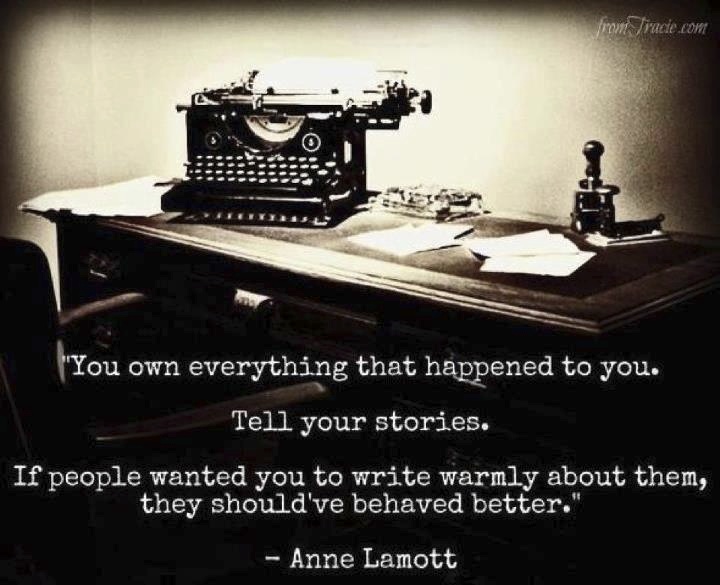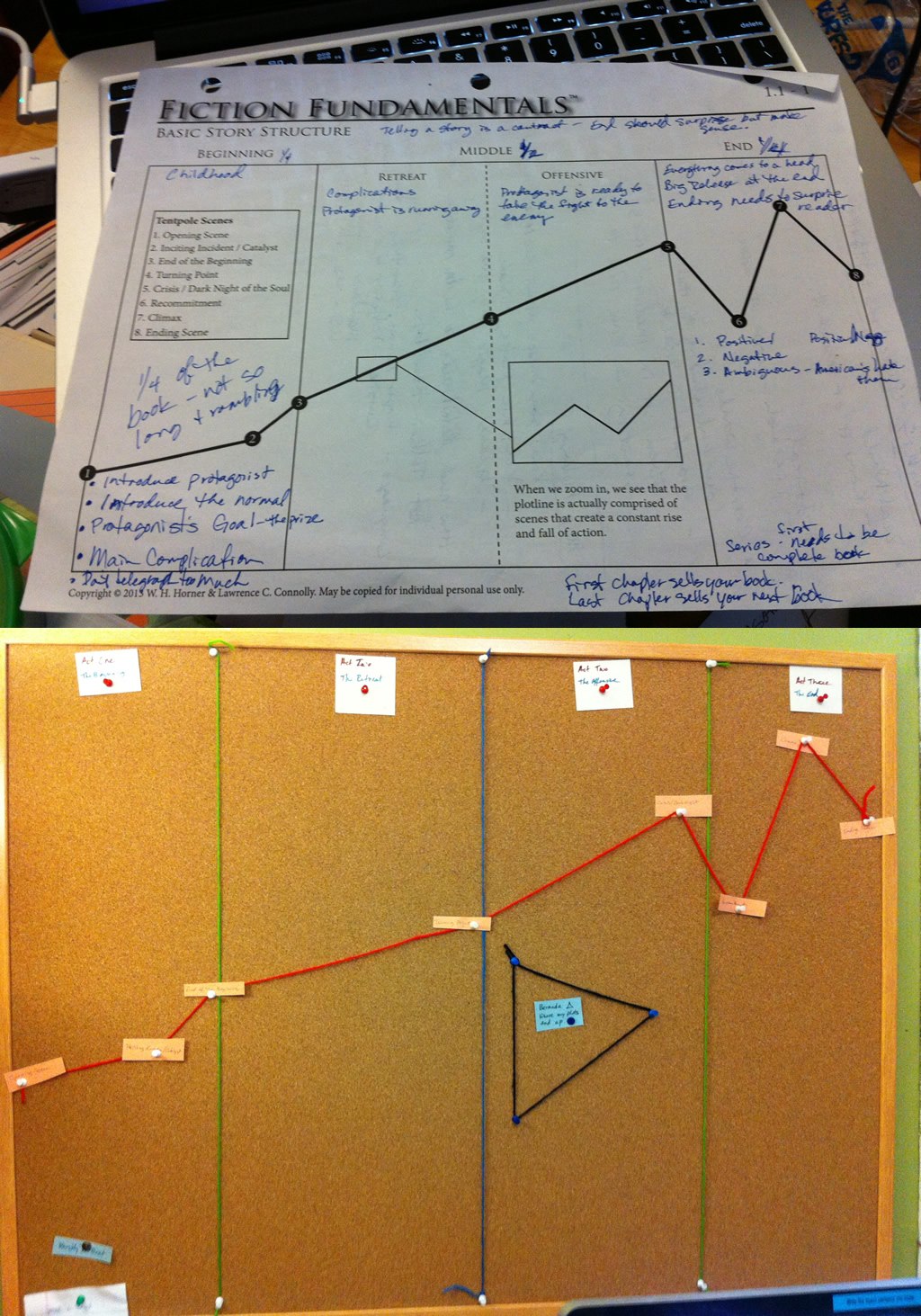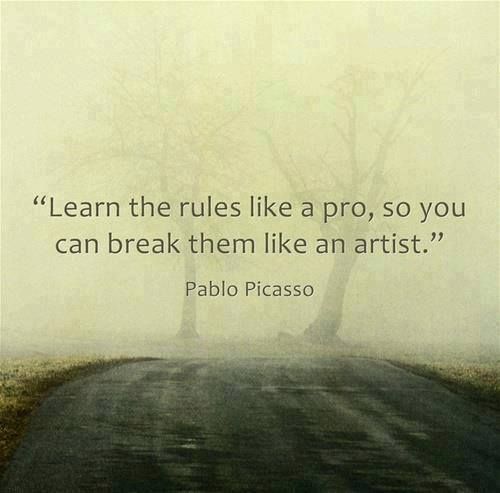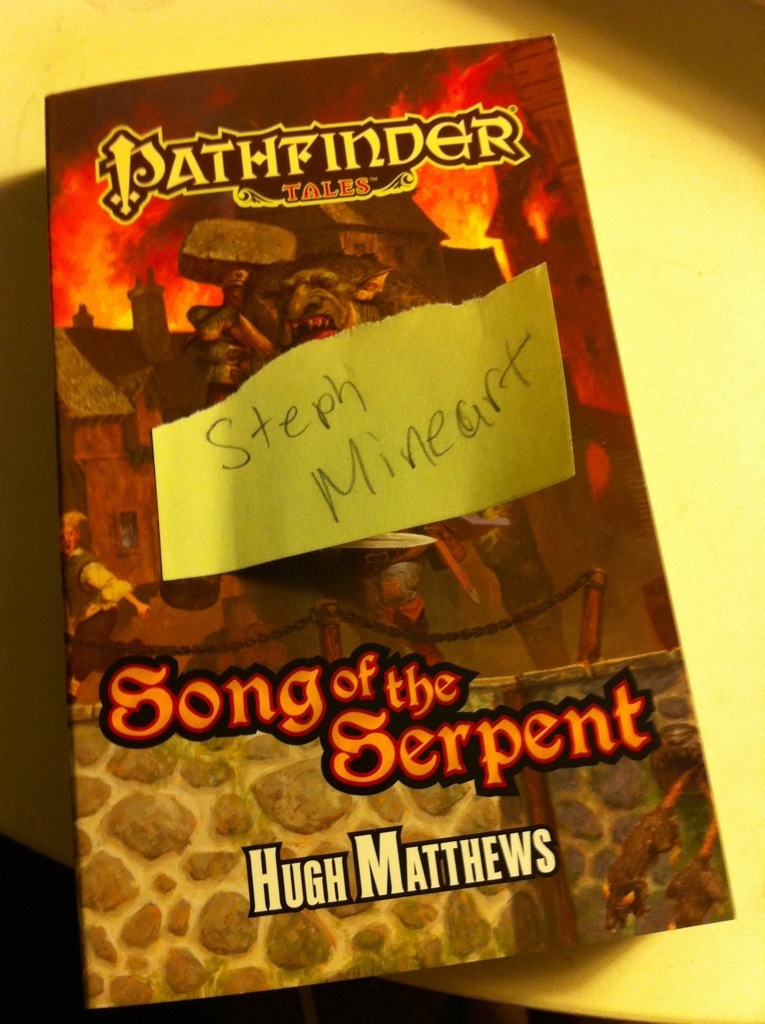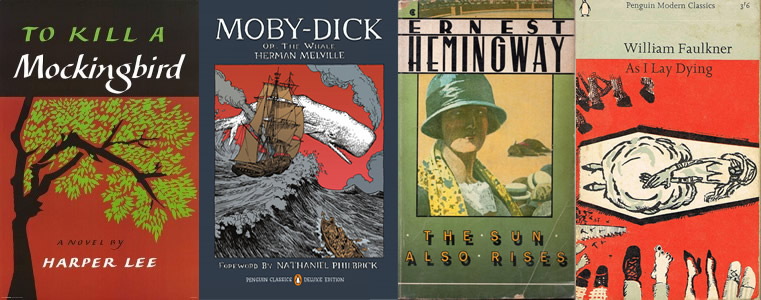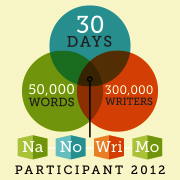NaNoWriMo 2013 Preparation
I decided to get serious about plot, rather than just pantsing-it completely. I transferred the handy chart I got at GenCon to my bulletin board. And noted the troublesome spot where my plots commonly end up.
The chart is from the “Fiction Fundamentals Part 1: Plotting and Planning” led by Lawrence Connolly & William Horner III, which I got a lot out of.
I still haven’t decided whether I’m going to work on my past novel until it’s done or noodle on one of the other two ideas I’ve got, but I figure I’ll try to get real outlines in place for all three before I start and decide which feels best.
Gen Con Writer’s Symposium 2013, Saturday in Review
WKS1345346 (Fiction Fundamentals Part 3: Putting on the Polish on Sat at 08:00 AM – 3 hours)
Lawrence Connolly, William Horner III
“In-depth workshop: learn how to make your story sing through application of effective revision and editing techniques.”
I was really sorry to miss this workshop because the other two these guys did on Thursday and Friday were so useful. I was feeling pretty under the weather Saturday morning, so I didn’t make it to this one. I’m hoping to get the handouts for this one from Horner on the internet, because the others were pretty great and I’ve already tacked them up to my bulletin board and started reviewing my outlines for two projects.
SEM1345284 (Exploring Genres: Urban Fantasy on Sat at 11:00 AM)
Richard Byers, Jennifer Brozek, Lucy Snyder, Larry Correia
“We teach you the tips and tricks you’ll need to write amazing urban fantasy stories.”
The urban fantasy genre is pretty popular right now, and in addition to that one popular storyline about sparkly vampires, there are a decent number of women writing in the genre — most of them writing stuff that’s not quite as silly as the sparkly vampires. Such a cool idea; supernatural in the city, in a landscape we recognize and understand. Lots of superhero comics are pretty much urban fantasy genres; interesting to see it take shape in novel form. Lots of the discussion surrounded setting; do you take a real city and transform it, copy and rename it, shift it’s landscape around? All of those are interesting strategies for world building in this genre.
SEM1345353 (Writer’s Craft: Dialogue, it is not just people talking! on Sat at 12:00 PM)
Maxwell Alexander Drake
“In-depth seminar: join author Maxwell Alexander Drake as he gives you some insights on how to craft dialogue.”
Drake is a pretty entertaining lecturer and although I knew most of what he covered in this seminar, I went to see him present again. I’m encouraged that my dialogue is already pretty damned solid and doesn’t hit any of the “don’ts” on the list.
WKS1345350 (Writer’s Craft: Schrödinger’s Plot on Sat at 01:00 PM)
Brad Beaulieu
“In-depth seminar: master plotting techniques, from basic structural concepts to plotting to breaking writer’s block.”
I took four different seminars on plot, and got something good from all of them, which is pretty cool. Brad’s turned around the idea that there’s not one potential answer but many about the direction your story could go.
SEM1345301 (Writer’s Craft: Screenwriting for Novelists on Sat at 02:00 PM)
Lou Anders
“Learn how novelists can apply Hollywood screenwriting techniques to enhance character, plot & theme.”
Lou really needed more time, because he had to move really quickly through his material. Fascinating stuff; he took a number of popular movies and made you identify the protagonist, antagonist and relationship characters, and it was a nice exercise in critical thinking about character motivation and how conflicting motivations drive the plot. I realized that in my own work I probably have too many characters and have pretty murky motivations for them that need to be more clearly defined in my head so that I can be more clear about what I’m writing and what I’m holding back on as my stories unfold.
Gen Con Writer’s Symposium 2013, Thursday and Friday in Review
Thursday
WKS1345344 (Fiction Fundamentals Part 1: Plotting and Planning on Thu at 08:00 AM – 3 hours)
Lawrence Connolly, William Horner III
“In-depth workshop: learn how to avoid extra work by planning your story and all of its elements from the beginning.”
This was easily the most useful of the day’s programs to me, although all of them added something to my arsenal of writing tools. I’ve read Story Structure Architect, but Horner’s overview on building plot spelled it out a bit more clearly for me, and Connolly’s character worksheet was the best one I’ve ever seen. I reworked a character that I have in progress while I was sitting in the seminar, and it completely lit the path to how I’ll approach writing that story.
SEM1345352 (Writer’s Craft: Don’t Tell Your Story, Show It! on Thu at 12:00 PM)
Maxwell Alexander Drake
“In-depth seminar: join author Maxwell Alexander Drake as he “shows” you some tricks to a more immersive writing style.”
Also an incredibly useful seminar – “Show vs. Tell” is something I’ve only understood in abstract, but Drake did a great job of illustrating the difference with examples that make the concept more clear, and he gave us some tools to go over what we’ve written and identify points where we’re telling more than showing. This will help especially with my NaNo novel to make sure I’m getting images on the page instead of exposition.
WKS1345347 (Writer’s Craft: The Structure of Scenes on Thu at 01:00 PM)
Brad Beaulieu
“In-depth seminar: learn everything you need to know about structuring scenes to create compelling stories.”
I’ve never felt like I had a problem writing scenes – most of mine are pretty satisfying. So I was surprised that I was getting a lot out of this particular seminar. I’ve never looked at a scene as a way to make the protagonist’s problem worse, but that’s completely true when you look closely at it – the protagonist is trying to accomplish something and every scene is a setback as the story moves forward until they work out the problem at the climax. Framing every scene like that and looking at the elements of it really helps see what’s going on.
SEM1345249 (Writer’s Craft: Should You Plot or Not? on Thu at 03:00 PM)
George Strayton, Jim Hines, Larry Correia, Scott Lynch
“Discover the benefits and pitfalls of plotting in advance and letting the plot unfold as you write.”
The short answer to the question that the seminar posed is “yes, you should plot” given that all of the writers there advocated plotting and no one was arguing the counterpoint. But it was still an interesting panel, as all members came from slightly different backgrounds. All of them had some insight into the plotting process, especially the tension between plotting and letting characters drive story – Hines noted that he plots extensively, begins writing, sees where the characters are driving the plot and then adjusts plot to make sure the characters still get where they’re going. Someone on the panel noted that some famous writer called plotting “light posts in the fog” which seems particularly apt. I thought they were quoting George R.R. Martin, but in hunting around for the quote, I discovered that Martin is one of the “letting the plot unfold as you write” advocates:
I hate outlines. I have a broad sense of where the story is going; I know the end, I know the end of the principal characters, and I know the major turning points and events from the books, the climaxes for each book, but I don’t necessarily know each twist and turn along the way. That’s something I discover in the course of writing and that’s what makes writing enjoyable. I think if I outlined comprehensively and stuck to the outline the actual writing would be boring.
SEM1345063 (Writer’s Craft: Literary Alchemy on Thu at 05:00 PM)
Brad Beaulieu, Gregory Wilson, James Sutter
“The right words can make a reader laugh, cry, or leap for joy. Explore the uncanny power of words.”
I always get a little more from seminars than I do from Panels, and the interplay between panel members sometimes loses the threads or takes you off on tangents. This one was didn’t quite catch me, as it wasn’t specific enough with examples. They broke down authors they thought were alchemists because their writing was “transparent” in the sense that they stripped down the prose to the essential, vs. writers who were more poetic with turns of phrase, but their concepts were still fairly abstract for me.
Thursday Summary:
Overall, Thursday’s panels alone were worth the cost of the four-day badge for me, because I’m getting enough out of it that it’s helping me recognize ways I can improve the stories I’m working on, and I’m inspired to sit down and tinker in a way that I haven’t really been since November’s NaNo.
Now let’s talk about women and Gen Con for a second.
Until I got the GenCon catalog today, I didn’t really have a breakdown of the speakers at the Writer’s Symposium. There are 52 authors doing presentations as part of the Writer’s Symposium. Of them, 11 are women. That’s less than 25%, slightly more than 20%. That’s problematic, as 51% of the population is women. A 30% gap between the number of women on the planet and the number of speakers at a symposium is too big a gap to write off or chalk up as a fluke. I’m sure the problematic imbalance at Gen Con is a reflection of the problematic imbalance in sci-fi and fantasy that has grown wider over the last 15 years or so… there used to be a lot more well-known women writers in those fields, even if there has long been a gender imbalance. Marion Zimmer Bradley, Octavia Butler, Ursula Le Guin, Anne McCaffrey have all died, and a new generation of women has not stepped into the limelight to replace them. I’m not sure why that is, but it certainly has a ripple effect that makes it’s way to Gen Con. I don’t know exactly what Gen Con might do about that imbalance other than being aware of it and trying to attract women to speak on panels as much as they can to offset what’s going on in the sci fi and fantasy publishing genres as a whole.
I think hearing from more women would have given me a lot of additional insight into writing and publishing that I didn’t get just from the male speakers, as great as they were. I would be curious to hear how women writers feel about job opportunities, querying publishers and agents and networking, and if they feel their experiences are more difficult or more easy than men in those areas.
After I noticed the gender imbalance among speakers on Thursday evening, I spent Friday doing a head count in each of the panels I attended, and got roughly 45-50% women attendees, so there are clearly women interested in writing who seem to be interested in sci-fi and fantasy as genres. I’m hoping asking questions of the organizers to speak to the issue and keep it in mind might improve the situation in future years.
Friday
WKS1345345 (Fiction Fundamentals Part 2: Creating Scenes on Fri at 08:00 AM – 3 hours)
Lawrence Connolly, William Horner III
“In-depth seminar: learn everything you need to know about structuring scenes to create compelling stories.”
This was another good solid workshop with some nice fundamentals – how to create tension, how to add sensory detail to help immerse the reader in the story, how to observe and convey emotion effectively, some notes on writing dialog well and some exercises in observing detail to help convey a realistic story. I’m pinning these handout pages up to my bulletin board over my desk so I’m looking at them and thinking about them as I’m writing.
SEM1345260 (Business of Writing: Career Building on Fri at 12:00 PM)
Gregory Wilson, Matt Forbeck, Kerrie Hughes
“Explore ways to make a career out of writing, and learn to build that career once you have it.”
Awesome session covering how those folks got into publishing and how to go about querying publishers and agents, what to put on your author website, how to promote your work, and what to focus on to get your career moving well. Gave me a real sense of optimism about the possibilities and a motivation to get my stuff in order and try to get people reading it and giving feedback. Kerrie was the first woman I’ve seen speak here, and I would have loved some more time to pick her brain about how she felt about women authors in her genre, since they are more rarely published.
SEM1345351 (Writer’s Craft: Point of View – What is the point? on Fri at 01:00 PM)
Maxwell Alexander Drake
In-depth seminar: join author Maxwell Alexander Drake as he breaks this confusing piece of the writing puzzle down.
Drake was great again today. I knew the basics of Point of View, but he did help highlight the advantages of different POV options and how POV should be something that you consciously choose based on your outline, not something you just fall into writing. Some aspects of your story might not be able to be told if you tell from the wrong point of view, so making the right choice can shape how your story goes.
WKS1345348 (Writer’s Craft: Tension on Every Page on Fri at 03:00 PM)
Brad Beaulieu
“In-depth seminar: discuss types of tension, as well as ways to maximize them to keep your reader glued to the page.”
Brad covered some of the same ground that Connolly and Horner did in my earlier session, but in greater scope, which was nice. His explanation of how to vary tension, how to use different types of tension and how to use short, medium, and long tension arcs over the course of the story to keep it moving made a lot of sense to me and made me want to go edit my Nano novel immediately.
SEM1345264 (Writer’s Craft: Novel Outlines on Fri at 04:00 PM)
John Helfers, Jerry Gordon, Saladin Ahmed, Brandon Sanderson, Erik Scott De Bie
“Discover the techniques and tricks for creating effective, compelling, and pitch-able novel outlines.”
It was really fun to watch everyone in the room turn into fangirls over Brandon Sanderson. He has a different technique for outlining than I had heard before, and that I thought it would be interesting to try. He picks key exciting “must have” scenes in his story and writes a paragraph synopsis of what happens in them, then puts three or four bullet points on what has to happen to get him to that scene from the previous one. That’s how he works out his own plots and how he was able to finish Robert Jordan’s work from fairly irregular notes about how the ending of the Wheel of Time saga should go. The other panelists were also strong advocates of plotting, and it was interesting to hear the critique of authors who famously don’t plot out their stories in advance – Stephen King, George R.R. Martin. I think I’m convinced that having a stronger outline is definitely something I need to work harder on. Fortunately I feel like I have a bit more insight into how to accomplish that.
Here’s another cool thing – they randomly select five or so attendees and give them free books in each of the panels, and I won a free book:
My Gen Con Writer’s Symposium Schedule
I think I’m probably a bit over-scheduled for GenCon this coming weekend – I’m signed up for these writing workshops and seminars. I’m thinking my brain is going to be pretty fried if I attempt to do all of this, so I’ll probably skip out on some of them strategically. Fortunately they’re all in the same area of the convention center, so getting from one to another will be easy. And I can take some breaks and visit the Exhibit Hall.
WKS1345344 (Fiction Fundamentals Part 1: Plotting and Planning on Thu at 08:00 AM – 3 hours)
SEM1345352 (Writer’s Craft: Don’t Tell Your Story, Show It! on Thu at 12:00 PM)
WKS1345347 (Writer’s Craft: The Structure of Scenes on Thu at 01:00 PM)
SEM1345249 (Writer’s Craft: Should You Plot or Not? on Thu at 03:00 PM)
SEM1345063 (Writer’s Craft: Literary Alchemy on Thu at 05:00 PM)
WKS1345345 (Fiction Fundamentals Part 2: Creating Scenes on Fri at 08:00 AM – 3 hours)
SEM1345260 (Business of Writing: Career Building on Fri at 12:00 PM)
SEM1345351 (Writer’s Craft: Point of View – What is the point? on Fri at 01:00 PM)
WKS1345348 (Writer’s Craft: Tension on Every Page on Fri at 03:00 PM)
SEM1345264 (Writer’s Craft: Novel Outlines on Fri at 04:00 PM)
WKS1345346 (Fiction Fundamentals Part 3: Putting on the Polish on Sat at 08:00 AM – 3 hours)
SEM1345284 (Exploring Genres: Urban Fantasy on Sat at 11:00 AM)
WKS1345350 (Writer’s Craft: Schrödinger’s Plot on Sat at 01:00 PM)
SEM1345301 (Writer’s Craft: Screenwriting for Novelists on Sat at 02:00 PM)
IN scoping out photos of previous year’s events, it looks like they don’t provide tables in the writer’s workshops, which is a little frustrating. It seems like a little thing but when you’re sitting in seminars all day, having a table for your laptop is a world of difference in convenience. I can’t imagine not taking my laptop, but without tables… I guess I’ll have to see. I hate taking notes by hand anymore.
I missed out on the Midwest Writer’s Workshop this year, but I’m planning to attend next year. I hope I’ll have my novel done by then, and a good start on a second one.
Character lists in famous novels
The characters in these lists are main characters and key secondary characters in these stories. In some cases there are additional secondary and minor characters not listed here. This list may be updated periodically with additional famous novels and their character lists.
The Great Gatsby Characters: 10
Nick Carraway
Jay Gatsby
Daisy Buchanan
Tom Buchanan
Jordan Baker
Myrtle Wilson
George Wilson
Owl Eyes
Klipspringer
Meyer Wolfsheim
Treasure Island Characters: 11
Jim Hawkins
Billy Bones
Black Dog
Squire Trelawney
Dr. Livesey
Captain Smollett
Long John Silver
Ben Gunn
Pew
Israel Hands
Tom Redruth
The Sun Also Rises Characters: 12
Jake Barnes
Lady Brett Ashley
Robert Cohn
Bill Gorton
Mike Campbell
Pedro Romero
Montoya
Frances Clyne
Count Mippipopolous
Wilson-Harris
Belmonte
Harvey Stone
Moby-Dick: or, The Whale Characters: 16
Ishmael
Ahab
Moby Dick
Starbuck
Queequeg
Stubb
Tashtego
Flask
Daggoo
Pip
Fedallah
Peleg
Bildad
Father Mapple
Captain Boomer
Gabriel
As I Lay Dying Characters: 16
Addie Bundren
Anse Bundren
Cash Bundren
Darl Bundren
Jewel Bundren
Dewey Dell Bundren
Vardaman Bundren
Vernon Tull
Cora Tull
Peabody
Lafe
Whitfield
Samson
MacGowan
Moseley
Armstid
To Kill a Mockingbird Characters: 18
Jean Louise “Scout” Finch
Atticus Finch
Jeremy Atticus “Jem” Finch
Arthur “Boo” Radley
Bob Ewell
Charles Baker “Dill” Harris
Miss Maudie Atkinson
Calpurnia
Aunt Alexandra
Mayella Ewell
Tom Robinson
Link Deas
Mrs. Henry Lafayette Dubose
Nathan Radley
Heck Tate
Mr. Dolphus Raymond
Mr. Walter Cunningham
Walter Cunningham
Adventures of Huckleberry Finn Characters: 25
Huckleberry Finn
Tom Sawyer
Widow Douglas and Miss Watson
Jim
Pap (Huck’s Father)
The Duke and the King
Judge Thatcher
The Grangerford family – Bob, Buck, Charlotte, Col., Emmeline, Sophia, Tom
The Wilks family – Harvey, Joanna, Mary Jane, Peter, Susan, William
Silas and Sally Phelps
Aunt Polly
Anna Karenina Characters: 26
Anna Arkadyevna Karenina
Alexei Alexandrovich Karenin
Alexei Kirillovich Vronsky
Konstantin Dmitrich Levin
Ekaterina Alexandrovna Shcherbatskaya (Kitty)
Stepan Arkadyich Oblonsky (Stiva)
Darya Alexandrovna Oblonskaya (Dolly)
Sergei Alexeich Karenin (Seryozha)
Nikolai Dmitrich Levin
Sergei Ivanovich Koznyshev
Agafya Mikhailovna
Countess Vronsky
Alexander Kirillovich Vronsky
Varvara Vronsky
Prince Alexander Dmitrievich Shcherbatsky
Princess Shcherbatskaya
Countess Lydia Ivanovna
Elizaveta Fyodorovna Tverskaya (Betsy)
Marya Nikolaevna
Madame Stahl
Varvara Andreevna (Varenka)
Yashvin
Nikolai Ivanovich Sviyazhsky
Fyodor Vassilyevich Katavasov
Landau
War and Peace Characters: nearly 600 characters
Related Reading:
Book Magazine’s The 100 Best Characters in Fiction Since 1900
Book Magazine, now defunct, compiled a panel of 55 authors, literary agents, editors, and actors in 2002 to “rank the top one hundred characters in literature since 1900.”
Damsel in Distress: Part 1 – Tropes vs Women in Video Games
The first video from Anita Sarkeesian’s kickstarter project “Tropes vs. Women in Video Games” is up and running, covering the “Damsel in Distress” trope.
You might remember that when Sarkeesian started this Kickstarter project, there was a huge surge of harassment directed at her for even starting the research, before she had even expressed her ideas on the subject [Slate article: Online Misogyny: Can’t Ignore It, Can’t Not Ignore It]
Sarkeesian’s story is a doozy, by the way. She started a Kickstarter page to raise money to make a documentary about the tropes used by video game designers to portray female characters. She hadn’t expressed an opinion about video games yet, but simply by stating that she would at some point in the future do so, she had to endure an absolute avalanche of misogynist abuse from men who hoped they could silence her before her too-scary-to-be-heard opinion could be voiced. Every access point they could exploit was used to try to get to her, especially her YouTube page. Her Wikipedia page was repeatedly vandalized with lies, links out to porn sites, and pornographic pictures.* Eventually, Wikipedia shut it down. Unfortunately for the misogynists, this sort of thing generated a lot of sympathy for Sarkeesian, and she was able to fundraise well beyond her original goals. Like, more than $90,000 beyond what she originally wanted to raise.
Some other NaNoWriMo Thoughts
Trying to write 50,000 words in a month felt like holding my breath under water – everything else was suspended while I worked on writing. I basically ate, slept, went to work and wrote. I cut out television, most socializing and practically all other stuff that invades my day. Trying to keep the house clean, pay attention to twitter or running errands all those distractions went on the back burner. (Facebook was a must, though – because interacting with the NaNo Indy group was a lifeline to keep me going.)
It worked, largely because I removed a lot of barriers to focusing and getting in the zone to writing, and the forced deadline can work wonders.
Is that sustainable, though? Can I really zone out my friends, turn off the television and blow off the house all the time?
I wish there were a better way to balance. Because not writing is not an option, now.
Cutting out the television is pretty easy. Helping around the house, running errands and socializing are more difficult. I’m considering whether twitter really has much of a place in my life anymore.
I need to simplify things so I can both write and interact with my spouse and go to my job without becoming an ascetic.
Your thoughts would be greatly appreciated on this matter.
NaNoWriMo 2012 – Validated
So.. I won NaNoWriMo again this year.
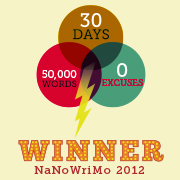
I finished three days early – with 50,058 words written this year added to what I wrote last year. Now I need to write the actual final chapters and not just scenes from the climactic ending, but hey – I’m a lot closer to a complete work than last year. Now it’s not a question of if I will ever self-publish, but when.
Last year at this time, I was reading over my novel, and I was really frustrated, because it seemed complete unrealistic. At about the half-way point of the story, I had one of my two main characters do something completely out of character for the way I had written about her up to that point. I did it because I couldn’t think of any other way to get her in the excruciating position she needed to be in so the villain could torment her and drive the rest of the plot. But that false note made all the rest of it seem really hard to believe. It just didn’t read right, and all the following events seemed flat and desperate, like a huge rationalization. I chewed on that for the whole rest of the year and didn’t know what to do. I loved the beginning and loved the characters, but I hated the middle and the end.
This year Garrett Hutson said something at the being of November about plot development along the lines of – “know where your characters are going to go, but to get them there, use a compass, not a map.” That set me thinking – okay, if that plot point seems out of character for my main character, what would she actually do instead? I threw out everything except the end where the characters needed to go, and started writing from just before that false note… and I realized if I changed the villain slightly, and added secondary villain who was working with and also at cross-purposes to the first one, I could get the MC into that excruciating position in a more real way, and then all the dominos started to fall one by one. Now I like the whole story from beginning to end. Even though I threw out 23,000 words I wrote last year and started over, this is a much better story, and one that makes me really happy to read throughout.
I’m in danger, though, of not keeping up with the story now. I hate that the 50,000 word mark was a finish line of sorts, because it’s not done at all, and I still need to keep writing it. It’s good, I think, and original, and interesting, so I need to actually push through and finish.
It was a huge accomplishment that I never thought I could do once, let alone twice. I need to make it work for real. If you could – cattle prod me, please? Bug me about it as much as possible so I don’t get complacent. This was cool, and something that was important to me to do, so I don’t want to let it slide.
NaNoWriMo 2012 – Day 9
8. 13,336 – 2750 (14497, +1161)
Those are my notations for Day 8 of National Novel Writing Month.
13,336 – that’s “par for the course” or the least word count for day 8 to stay on track to “win.”
2750 – the number of words I wrote yesterday.
14497 – total word count for November 2012. I have the chapters I wrote last year, but I’m not counting them in this years’ event. Some of those will get trashed and some considerably altered when I’m finished.
+1161 – the number of words I have as a “word count cushion” over the minimum to stay on course.
So I’m keeping up the pace pretty well. I’m poised to do more this weekend that I hope will really put me ahead. I have a pretty clear idea of where I’m going, too, but I’m trying to be flexible enough to make sure I can make changes. As our friend Garrett says – “Know where you’re going, but use a compass and not a road map.”
I have a much more fully formed notion of setting this year than last, which really helps me add detail to scenes and paint a more interesting visual picture than last year, and helped me add detail to the action as well. And I think I have a more complete and satisfying ending in mind that I did last year, with some nice turning points to get us there.
I’m very optimistic that I can get closer to complete by the end of November, and ready to polish. My goal is to have it ready to show my editor – that would be Stephanie – by February. I have one or two other people I want to get feedback from as well. And with editing and revisions based on feedback, I’d really like to have it ready for publication by the end of April. I’m going to use Book Tango to self-publish for e-publication, I think. I don’t have an agent lined up or anything, so I don’t anticipate being able to get the attention of a traditional publisher at first. We’ll see.
